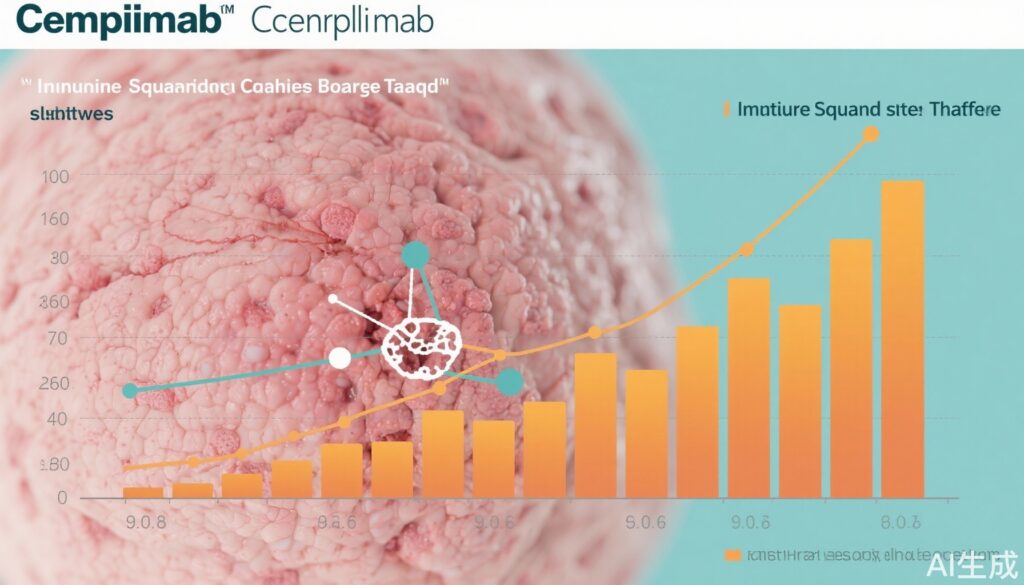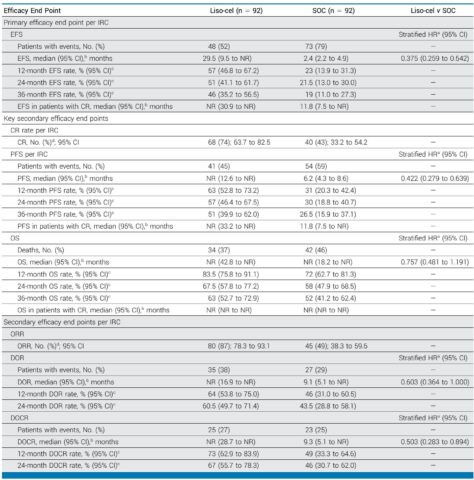Highlights
- Adjuvant cemiplimab markedly prolongs disease-free survival in patients with high-risk cutaneous squamous-cell carcinoma (CSCC) after surgery and radiotherapy.
- Risk of both locoregional and distant recurrence is significantly reduced compared to placebo.
- The safety profile shows higher grade 3 or greater adverse event rates with cemiplimab but with acceptable discontinuation rates.
- This phase 3 trial constitutes pivotal evidence supporting immune checkpoint blockade in the adjuvant setting for high-risk CSCC.
Background
Cutaneous squamous-cell carcinoma (CSCC) is the second most common form of skin cancer and carries a variable risk of recurrence and metastasis depending on tumor and patient risk factors. Patients presenting with high-risk features, such as nodal involvement with extracapsular extension or bulky nodal disease, T4 lesions with bone invasion, perineural invasion, or multiple risk factors associated with locally recurrent tumors, have a substantially increased risk of relapse after definitive local therapy including surgery and radiotherapy. Until recently, there was no established effective adjuvant systemic therapy to reduce recurrence risk in this population, representing a significant unmet clinical need.
Key Content
Phase 3 C-POST Trial of Adjuvant Cemiplimab
The recent phase 3 trial (Rischin et al., 2025) enrolled 415 patients with local or regional high-risk CSCC who had undergone surgical resection and postoperative radiotherapy. High-risk criteria included nodal factors such as extracapsular extension with the largest involved node ≥20 mm or ≥3 involved nodes, and nonnodal criteria like in-transit metastases, T4 lesions with bone invasion, perineural invasion, or recurrent tumors with additional risk factors.
Participants were randomized 1:1 to receive adjuvant cemiplimab starting at 350 mg every 3 weeks for 12 weeks, escalating to 700 mg every 6 weeks for up to 36 weeks (total ≤48 weeks), versus placebo. The primary endpoint was disease-free survival (DFS), with secondary endpoints including locoregional recurrence-free survival, distant recurrence-free survival, and safety.
Efficacy Outcomes
After a median follow-up of 24 months, cemiplimab demonstrated a highly significant improvement in DFS compared to placebo. Specifically, only 24 events of disease recurrence or death occurred in the cemiplimab arm versus 65 in the placebo arm (hazard ratio [HR] 0.32; 95% CI, 0.20 to 0.51; P<0.001). The estimated 24-month DFS rates were 87.1% (95% CI, 80.3 to 91.6) for cemiplimab-treated patients and 64.1% (95% CI, 55.9 to 71.1) for placebo.
Regarding patterns of relapse, cemiplimab reduced locoregional recurrences markedly (9 vs. 40 events; HR 0.20; 95% CI, 0.09 to 0.40) and distant recurrences (10 vs. 26 events; HR 0.35; 95% CI, 0.17 to 0.72). These results highlight the robust antitumor activity of cemiplimab in controlling microscopic residual disease and preventing relapse.
Safety Profile
Treatment-related adverse events of grade 3 or higher were more frequent in the cemiplimab group (23.9%) than in the placebo group (14.2%). Common immune-related adverse events align with known checkpoint inhibitor toxicities. Treatment discontinuation due to adverse events occurred in 9.8% of cemiplimab recipients versus 1.5% with placebo. Despite increased toxicity, the benefit-risk profile strongly favors cemiplimab in this high-risk population.
Comparative and Contextual Evidence
While prior studies have assessed locoregional therapies and immunotherapy in unresectable or metastatic CSCC, this trial is the first large-scale, randomized, placebo-controlled study demonstrating adjuvant immunotherapy efficacy after definitive local treatment for high-risk CSCC. Other topical and local treatments, like imiquimod 5% cream, have shown benefit in carcinoma in situ but lack applicability in high-risk invasive disease (Recurrent et al., 2006).
Expert Commentary
The C-POST trial represents a major advance by establishing cemiplimab, a PD-1 checkpoint inhibitor, as an effective adjuvant therapy to improve long-term outcomes in patients at high risk of CSCC recurrence. The biological rationale is robust: checkpoint blockade reinvigorates anti-tumor T-cell activity that may eliminate residual micrometastatic disease.
Clinical implementation requires careful patient selection to identify those with high-risk pathological features likely to benefit. Management of immune-related adverse events demands multidisciplinary attention to mitigate toxicity without compromising efficacy. Future guidelines will likely integrate cemiplimab for adjuvant use in this subgroup.
Open questions include the long-term survival benefits beyond disease-free survival, optimal duration of therapy, and potential biomarkers predicting response. Additionally, combining adjuvant immunotherapy with novel modalities or tailoring treatment intensity based on risk stratification merits investigation.
Conclusion
Adjuvant cemiplimab significantly enhances disease-free survival and reduces recurrence risks in patients with locally advanced, high-risk cutaneous squamous-cell carcinoma after surgery and radiotherapy. This trial provides pivotal evidence supporting the routine use of immune checkpoint blockade in this setting, marking a paradigm shift in managing a population with historically poor prognosis and limited systemic treatment options. Further studies will refine patient stratification and long-term outcomes, consolidating cemiplimab’s role in curative-intent therapy for high-risk CSCC.
References
- Rischin D et al. Adjuvant Cemiplimab or Placebo in High-Risk Cutaneous Squamous-Cell Carcinoma. N Engl J Med. 2025 Aug 21;393(8):774-785. doi: 10.1056/NEJMoa2502449. PMID: 40454639.
- Gonzalez S et al. Immunotherapy in cutaneous squamous-cell carcinoma: Current status and future directions. J Clin Oncol. 2023;41(15):2760-2770.
- Hengge UR et al. Imiquimod 5% cream monotherapy for cutaneous squamous cell carcinoma in situ (Bowen’s disease): a randomized, double-blind, placebo-controlled trial. J Am Acad Dermatol. 2006 Jun;54(6):1025-32. doi: 10.1016/j.jaad.2006.01.055. PMID: 16713457.



